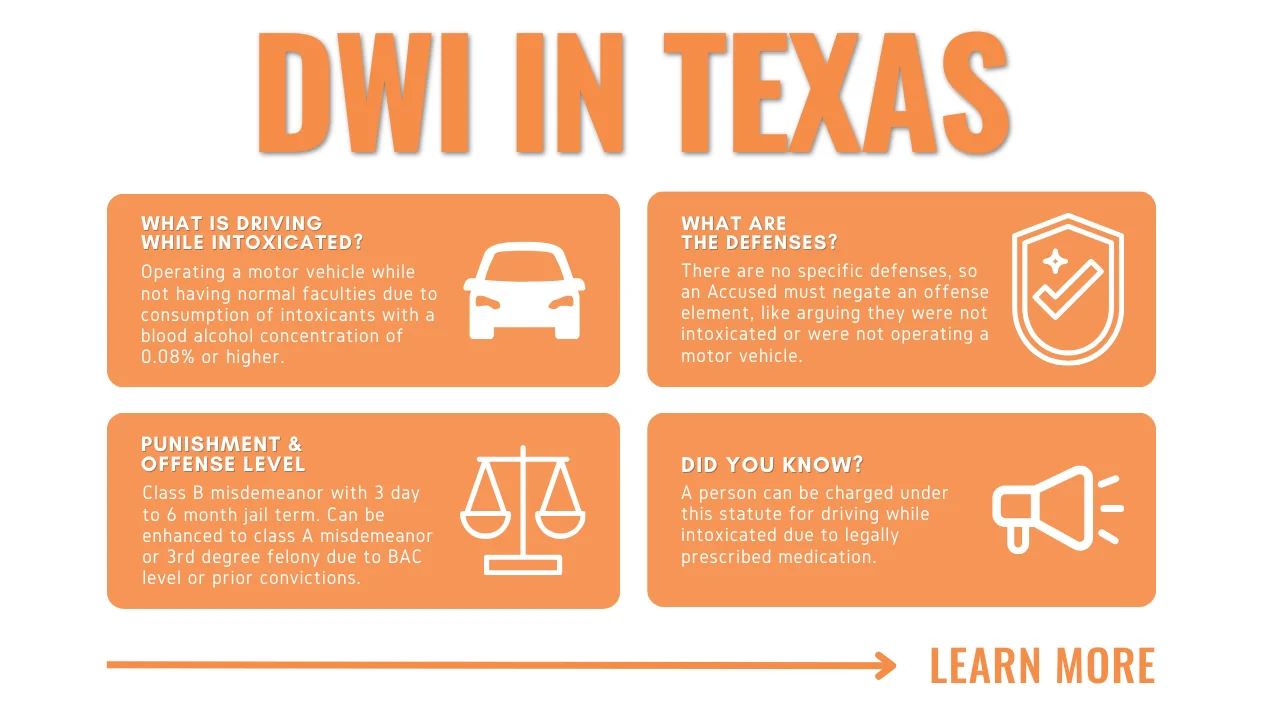A third DWI offense where the Defendant has at least two prior DWI convictions is a felony in Texas. Any prior DWI conviction, probation, or deferred adjudication case counts as a prior offense for this felony. Additionally, even out-of-state convictions and those older than 10 years count as prior DWI convictions under the Texas Penal Code.
A prior, unadjudicated DWI arrest does not count as a conviction and cannot be used for enhancement purposes. Similarly, a DWI expungement is not a prior conviction under this law.
- What makes a DWI a felony in TX? Two prior DWI convictions will make any subsequent DWI arrest a felony in Texas. DWI cases resulting in the serious bodily injury, or death, of another, including the motorist’s passenger, are punishable as the felony offenses Intoxication Assault, or Intoxication Manslaughter, respectively. DWI cases involving child passengers are also subject to felony enhancement in Texas criminal law.
- Is 3 DWI a felony in Texas? Yes, after two prior DWI convictions, a third DWI offense is a third degree felony in Texas. A DWI 3rd carries a maximum $10,000 fine, and 2-to-10 years imprisonment in a Texas Department of Criminal Justice (TDCJ) penitentiary. Defendants with prior DUI convictions should consult an experienced criminal defense attorney to avoid these 3rd DUI Texas penalties.
WHAT HAPPENS IF YOU GET A 3RD DWI IN TEXAS?
A person who commits a third offense DWI is subject to arrest and felony prosecution. Felony DWI cases are then required to proceed before a grand jury where the prosecutor must meet the initial burden of proof for an indictment. The bond amounts for DWI 3rd are typically costlier than misdemeanor cases and pretrial bond requirements have stricter conditions, including Ignition Interlock Device (breathalyzer) monitoring, GPS tracking, sobriety counseling, and regular drug, alcohol, and controlled substance testing.
DWI third offense Texas defendants are also subject to a revocation of driving privileges, including by administrative license suspension by the Texas Department of Public Safety. This is due to the Implied Consent Law in Texas.
- What happens when you get 4th DWI in Texas? A fourth offense DWI is normally punishable as a third degree felony under the Texas Penal Code. However, this charge can be enhanced to a second degree felony if the defendant has a prior felony conviction, including a felony DWI. Multiple DWI offenses will otherwise result in greater court supervision, aggressive prosecution, and more severe punishment, including stricter probation conditions and lengthier incarceration terms.
- What happens if you get 5th DWI in Texas? A fifth offense DWI is normally punishable as a third degree felony under the Texas Penal code. However, this charge is subject to enhancement to a second degree felony or the imposition of a 25-year minimum jail sentence if the person has either one or two prior felony convictions, including for felony DWI.
TYPICAL PUNISHMENT FOR 3RD DWI IN TEXAS?
DWI 3rd is a third degree felony subject to a maximum $10,000 fine and between 2 and 10 years imprisonment with the Texas Department of Criminal Justice (TDCJ). A DWI 3rd also carries a Texas driver’s license suspension as well as the inherent collateral consequences of a felony conviction, like jeopardized employment and immigration status, increased vehicle insurance, and a revocation of gun rights.
- Is jail time mandatory for 3rd DWI in Texas? Yes, a conviction for a third DWI will result in a prison sentence of no less than 2 years and no more than 10 years. Even if probation is granted, all Defendants convicted of DWI 3rd or more in Texas are required to serve a minimum of ten days in jail as part of any plea agreement.
- Can I get probation for a 3rd DWI in Texas? Yes, Defendants facing a 3rd DWI in Texas are eligible for probation. Felony DWI probation normally involves stricter reporting requirements in addition to many conditions such as drug and alcohol testing, substance abuse sobriety counseling, community service, money in court costs and fees, and ignition interlock (breathalyzer). The maximum length for DWI 3rd probation is 10 years.
CAN YOU GET DEFERRED ADJUDICATION FOR FELONY DWI IN TEXAS?
No, felony DWI charges do not qualify for deferred adjudication in Texas pursuant to the Code of Criminal Procedure. Typically only first-time DWI charges are eligible for deferred adjudication if they do not involve a motor vehicle accident or a BAC (blood alcohol content/concentration) over 0.15 percent.
- How to avoid jail time for 3rd DWI Texas? A person can avoid jail time for a 3rd DWI in Texas by implementing a strategic DWI defense. An effective defense will be well-versed in intoxication crime investigation and science, as well as in building compelling mitigation strategies. A knowledgeable Texas DWI lawyer, for example, can attack the police officer’s reasonable suspicion/probable cause determination, the blood draw warrant validity, or the administration of the blood test to secure a dismissal. Similarly, an experienced DWI defense attorney can leverage these issues in conjunction with a strong mitigation packet to obtain a plea bargain reduction to avoid jail time for 3rd DWI in Texas.
- What is the Statute of Limitations for 3rd DWI in Texas? A DWI 3rd has a 3-year Statute of Limitations in Texas. This means a person can only be prosecuted for up to 3 years after commission of the criminal charge.
CAN A DWI FELON OWN A GUN IN TEXAS?
No, a DWI felon cannot own or possess a gun in public in Texas. Under federal law, a convicted felon cannot own, purchase, or possess a gun under any circumstances. However, state weapon laws differ in that a convicted felon can possess a firearm in their home after five years have passed since the completion of their sentence, probation, or parole.
- Can you expunge a DWI felony in Texas? Yes, a DWI felony can be expunged if it resulted in a dismissal or jury trial acquittal. A DWI felony conviction does not qualify for expungement in Texas.
- Can a felony DUI be reduced to a misdemeanor in Texas? Yes, a Felony DWI can be reduced to a misdemeanor in Texas. However, Texas law enforcement and prosecutors have strict alcohol intoxication recidivism policies and do not casually reduce cases. A felony reduction requires a concerted DWI defense. Felony drunk driving Defendants should consult with a Texas DWI lawyer or criminal defense law firm to assess their case. Driving Under the Influence (DUI) is not punishable as a felony in Texas.
BOND FOR 3RD DWI IN TEXAS?
Defendants facing DWI 3rd charges are eligible for release on bail bond in Texas. Felony bond amounts are generally costlier than those in misdemeanor cases. A magistrate judge ultimately determines a felony bond amount and can consider several factors in this calculus, including the nature of the case, its evidence, and the Defendant’s criminal record.
- DWI 3rd offense Texas Penal Code? The statutory framework for the DWI 3rd offense is contained in Section 49.04 of the Texas Penal Code. The statute sets forth the elements for this offense as well as the different punishment and sentencing terms.
BEST TEXAS DUI LAWYERS
Trey Porter Law provides powerful representation for people facing DUI and DWI charges across Texas. Results matter most when your freedom and future are on the line. Trey Porter Law brings over 40 years of combined experience, strategic knowledge, and a hard-earned reputationof winning to every case the firm takes on. The top-rated lawyers at TPL have a steadfast commitment to uncompromising results.
















